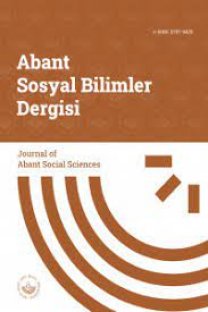Üniversitede Bilgi Kültürü -AİBÜ Eğitim Fakültesi Örneği-
Bu çalısmada A)BÜ Egitim Fakültesi’nin bilgiye ulasma, kullanma, gelistirme ve paylasma konularında nasıl bir kültür olusturdugu ögretim elemanlarının algılarına dayanarak belirlenmeye çalısılmıs ve ögretim elemanlarının görüslerinin kisisel degiskenlere göre anlamlı farklılık gösterip göstermedigi arastırılmıstır. Bu amaçla 2007–2008 egitim ve ögretim yılında A)BÜ Egitim Fakültesi’nde görev yapan 142 ögretim elemanına “Örgütsel Bilgi Kültürü Ölçegi” uygulanmıstır. Arastırma sonucunda ögretim elemanlarının örgütsel bilgi kültürü açısından fakültelerini en olumlu olarak degerlendirdikleri durumlar, fakültedeki ögretim elemanları etik sınırlar içinde istedikleri konuda arastırma ve yayın yapmaları, bilgiye ulasma sürecinde etik ilkelere uymaları ve alanlarıyla ilgili seminer, konferans, sempozyum, kongre vb bilimsel etkinliklere katılmaları seklindedir. Fakültenin bilgi kültürü bakımından en zayıf durumları ise fakültede bilgi paylasımını özendiren bir örgüt kültürü olmaması, ulasılan bilgilerin fakültedeki diger birey ve gruplarla paylasılmamasıdır. Kisisel degiskenler bakımından ögretim elemanlarının görüslerinde anlamlı fark ortaya çıkmamıstır.
Anahtar Kelimeler:
Üniversite, kültür, örgütsel kültür ve bilgi kültürü.
KNOWLEDGE CULTURE IN A UNIVERSITY -AIBU Education Faculty Case-
The aim of the present study is to investigate the nature of the culture established in AIBU Education Faculty in relation to access, use, improve and share knowledge referring to the perceptions of the academic staff and their perceptions were examined whether a significant difference is observed or not with respect to certain variables related to the academic staff of the faculty. For the purpose of the present study, the “Organizational Knowledge Culture Inventory” was completed by (n=142) academic staff of the faculty during the 2007-2008 academic year. The results of the study indicated that the academic staff perceptions had the highest mean scores in the following items, as; the academic staff had an opportunity to do research and to make publications in any topic area within the limits of ethical values, taking into account the ethical values in accessing knowledge and participating in scientific activities related to their subject areas as; seminars, symposiums and conferences and etc. However, the lowest mean scores were related to the items about an organizational culture that have a stimulating atmosphere to share knowledge and not sharing the knowledge with other individuals and groups in the faculty. Also no significant differences were found between the demographical characteristics of the academic staffs and their perceptions.
Keywords:
-,
___
- Akdemir, B.; Y. C. Cukacı, (2005). “Örgüt Kültürü Değerleriyle Örgütsel Öğrenme Düzeyi Arasındaki İlişkinin Belirlenmesi ve Bir Araştırma”. Sosyal Siyaset Konferansları. İnt. Adr.http://www.calisma.org/index.php?option=com_conten t&task=view&id=2171&Itemid=61, İndirilme tarihi: 14.05.2008
- Anderson, J.; T. T. Selvarajan; J. Slattery. (2006). “Influences of New Employee Development Practices on Temporary Employee Work-Related Attitudes”. Human Resource Development Quarterly. 17 (3): 279-303.
- Anthony, D. T.; A.W. Kritsonis, E.D. Herrington. (2007). “An Analysis of Human Resource Management: Involving Administrative Leadership as a Means to Practical Applications: National Focus”, The Lamar University Electronic Journal of Student Research. Spring 2007.
- Awbrey, S.M. (2005). “General Education Reform As Organizational Change: Integrating Cultural and Structural Change”. The Journal Of General Education, 54 (1): 1–21.
- Balcı, A. (2002). Etkili Okul Okul Geliştirme Kuram Uygulama ve Araştırma. (3. Baskı). Ankara: PegemA Yayınları
- Bartell, M. (2003). “Internationalization of Universities: A University Culture-Based Framework”. Higher Education, 45: 43–70.
- Bourdieu, P. (1997). Toplumbilim Sorunları. Çev: I. Ergüden, İstanbul: Kesit Yayıncılık.
- Bovvditch, J., A.F. Buono (1990). A Primer on Organizational Behavior, Newyork: John Wiley and Sons.
- Butcher, J. (2007). “Human Resource Management: Managerial Efficacy In Recruiting and Retaining Teachers- National Impications”. The Lamar University Electronic Journal of Student Research. Summer, 2007.
- Clark, K. (1994). “Knowledge Ethics and the New Academic Culture”. Change, 26(1): 8–15.
- Doğan, B. (1997). Örgüt Kültürü, İstanbul: Beta Basım Yayın.
- Ellis, D. G. ve Maoz, I. (2003). “A Communication and Cultural Codes Approach to Ethnonational Conflict”. The International Journal of Conflict Management. 14: 255– 272.
- Erdoğan, İ. (1991). İşletmelerde Davranış. İstanbul: İstanbul Üniversitesi İşletme Fakültesi Yayın No: 242.
- Eren, E. (2004). Örgütsel Davranış ve Yönetim Psikolojisi. İstanbul: Beta Basım Yayın.
- Erengül, B. (1997). Kültür Sihirbazları. İstanbul: Evrim Yayınevi.
- Gizir, S. (2003). “Örgüt Kültürü Çalışmalarında Yöntemsel Yaklaşımlar.” Kuram ve Uygulamada Eğitim Yönetimi. 35: 374–397.
- Grenberg, J. V. ve R. A. Baron. (2000). Behavior in Organizations. Englewood Cliffs: Prentice- Hall.
- Karasar, N. (2005). Bilimsel Araştırma Yöntemi. Ankara: Nobel Yayınları.
- Khatri, N. (1999). “ Emerging Issues in Strategic HRM in Singapore” International Journal of Manpwer. 20 (8): 516–529.
- Kowalski, T. J. (2000). “Cultural Change Paradigms and Administrator Communication”. Contemporary Education. 71 (2): 4–12.
- Pacanowsky, M. E. ve Trujillo-O’Donell, N. (1982). “Communication and Organizational Culture”. The Western Journal of Speech Communication. 46: 115–130.
- Morgan, G. (1998). Yönetim ve Örgüt Teorilerinde Metafor. Çev: G.Bulut. İstanbul: BZD Yayıncılık.
- Murat, G. ve B. Açıkgöz. (2007). “Yöneticilerin Örgüt Kültürü Algılamalarına İlişkin Bir Analiz: Zonguldak Karaelmas Üniversitesi Örneği.” ZKÜ Sosyal Bilimler Dergisi. 3 (5): 1-20.
- Ott, J. S. (1989). “The Organizational Culture Perspective”, (Chapter 3). Organizational Culture: Concepts, Definitions, and a Typology). Chicago: Dorsey Press
- Şimşek, N., M. Fidan. (2005). Kurum Kültürü ve Liderlik. Konya: Tablet Kitabevi.
- Şişman, M. (2002). Örgütler ve Kültürler. Ankara: Pegem A Yayıncılık.
- Terzi, A. R. (2000). Örgüt Kültürü. Ankara: Nobel Yayınları
- Tunç, B. ve Ö. Çelikkaleli. (2005). “Üniversitede Bilgi Kültürü: Mersin Üniversitesi Eğitim Fakültesi Örneği”. Mersin Üniversitesi Eğitim Fakültesi Dergisi. 1 (2): 181-195.
- Uğur, A. (2002). Kültür Kıtası Atlası. İstanbul: YKY Yayınları.
- Vural, B. A. (2003). Kurum Kültürü. İstanbul: İletişim Yayınları.
- www.hunersencan.com/files/orgutsel_kultur_metin.doc indirilme tarihi: 24.05.2008
- Yayın Aralığı: Yılda 3 Sayı
- Başlangıç: 2000
- Yayıncı: Abant İzzet Baysal Üniversitesi Sosyal Bilimler Enstitüsü
Sayıdaki Diğer Makaleler
Uluslararası İnşaat Sözleşmesi Modeli Olarak FIDIC İnşaat İşleri Sözleşme Şartları
Okul Öncesi Eğitim Kurumlarında Aile Katılımı
Üniversitede Bilgi Kültürü -AİBÜ Eğitim Fakültesi Örneği-
Türkan ARGOn, İsmail Menep, T. Yaçın Bayram
Selime Güzelsarı SARI, SAADET AYDIN
